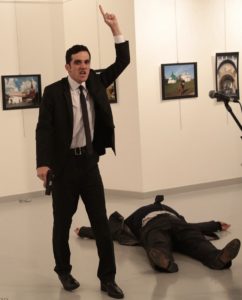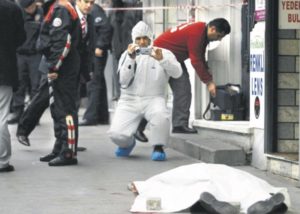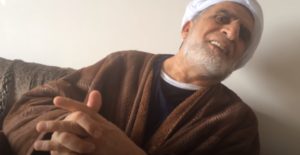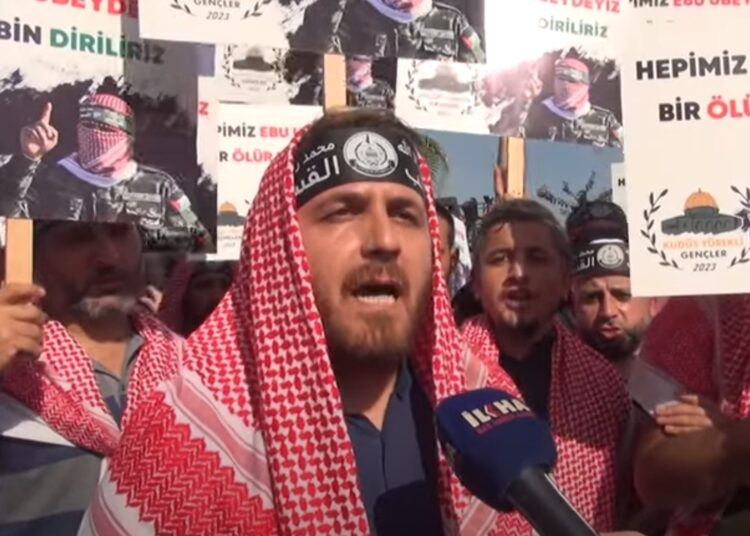Abdullah Bozkurt/Stockholm
An assertive campaign, endorsed by the Turkish government, to support Hamas and its military arm, the Izz ad-Din al-Qassam Brigades, responsible for the attacks on Israeli civilians and military targets on October 7, has raised concerns about further radicalization among the Turkish population.
Posters featuring Abu Obaida, a Palestinian militant serving as the spokesperson for the Qassam Brigades, have been displayed during public demonstrations. At these gatherings young men have dressed in clothing resembling his, complete with a keffiyeh covering their faces. Their demands are clear: They call for armed jihad and ask the government to facilitate their involvement with the Qassam Brigades in combat against the Israeli army.
At a majority of these rallies, protestors fervently chant slogans praising the Qassam Brigades, lauding its fighters and expressing their strong desire to join Hamas in its conflict with Israel. Some of these rallies have been televised live on various Turkish TV networks, which allowed Hamas propaganda to reach a wider audience, resulting in far-reaching influence across Turkey.
There is no doubt that the protestors have been emboldened by Turkish President Recep Tayyip Erdogan’s staunch anti-Israel stance. Erdogan has openly endorsed Hamas, rejected the label of the militant organization as terrorist and described Qassam Brigades fighters as liberators and mujahedeen who are defending their homeland.
The concern over the malign influence of Hamas in radicalizing Turks is well founded. This is evident from the fact that some deadly incidents in Turkey have shown traces of Hamas propaganda, which contributed to the radicalization and indoctrination of individuals by Hamas’s extremist narrative.
As an example, the evidence presented in the murder case of the Russian ambassador to Turkey, Andrei Karlov, reveals that a 22-year-old radicalized police officer, Mevlüt Mert Altıntaş, who assassinated the ambassador on December 19, 2016, was an ardent supporter of Hamas.
According to a forensic report dated January 26, 2018, following an examination of a Toshiba brand USB seized from the assassin’s residence, Altıntaş had been listening to Hamas nasheeds, jihadist songs that are used as a popular tool used in the militant organization’s propaganda campaigns.

Immediately following the attack, which was broadcast in real time by Turkey’s state-run television network TRT, the assailant declared that his actions were in response to Russian military operations against jihadist groups in Syria. Unfortunately the case was stymied by the government of President Erdogan, as those individuals who had played a role in radicalizing the police officer were spared from facing criminal charges.
Hamas nasheeds often feature members of the Qassam Brigades training with weapons and launching attacks against Israelis, accompanied by rousing music in the background. The audiovisual propaganda disseminated by Hamas is strongly antisemitic, depicting Jews as enemies, and they include religious narratives that encourage Muslims worldwide to support their violent and bloody campaign.
Similar videos also surfaced following the attacks by the Qassam Brigades on October 7, and subsequent videos depict militants engaged in battles with the Israeli army responding to the deadly Hamas terrorist attacks.
Another indication of Hamas’s influence on radicalization among Turks is evident in the case of the slain Turkish-Armenian journalist Hrant Dink. His murder pointed to shadowy elements within the Turkish security and intelligence establishments.
Yasin Hayal, who convinced 17-year-old Ogün Samast to carry out the murder of Dink on January 19, 2007, has long been a staunch supporter of Hamas. According to intelligence documents, he led protests in the northeastern province of Trabzon after Israel’s killing of Hamas founder and spiritual leader Sheikh Ahmed Yassin in 2014. Hayal had also attempted to travel to Chechnya with the intention of participating in jihad and had been involved in a bomb attack at a Trabzon branch of McDonald’s in October 2004
Another case illustrating Hamas’s influence on terrorism in Turkey is the twin bombing that occurred in Ankara on October 10, 2015. This devastating attack, the deadliest terrorist incident ever recorded in Turkey, resulted in the death of 107 people, including the two suicide bombers. The attack was blamed on the Islamic State in Iraq and Syria (ISIS).

Yunus Durmaz, an Afghan-trained, hardcore ISIS militant who led one of the most secretive ISIS cells in Turkey and was among the planners of the Ankara attack, also showed support for Hamas. During an examination of the hard drive recovered from Durmaz’s apartment in Şahinbey, a district in Turkey’s southeastern province of Gaziantep, it was revealed that the ISIS militant possessed several documents related to Hamas. These documents detailed the activities of Ibrahim al-Makadmeh, a senior Hamas leader and head of its military wing, who was killed by Israel in 2003.
In another criminal case where the influence of Hamas was detected by investigators, the teachings of Abdullah Yusuf Azzam, a Palestinian cleric who played a key role in the establishment of Hamas and was one of the founding members of al-Qaeda, were evident. Azzam, often referred to as the ‘Father of Global Jihad,’ reached out to Turkish youths through translated works such as a book titled ‘Lovers of the Paradise Maidens’ (Hurilerin Aşıkları in Turkish), which commemorated the lives of more than 150 mujahideen who perished in the Soviet-Afghan jihad. Azzam was killed in 1989.

Azzam’s teachings had a notable impact on a Turkish jihadist group known as Tahşiyeciler, led by Mollah Muhammed (also known as Mullah Muhammed el-Kesri, with his real name being Mehmet Doğan). This group advocated armed jihad in support of the late al-Qaeda leader, Osama bin Laden, and promoted the view that Christians and Jews were infidels who should be targeted for elimination wherever they were found. They even went as far as urging the beheading of Americans.
During police raids on the residence of Mehmet Nuri Turan, an indicted member of Tahşiyeciler, Azzam’s book of jihad lectures was among the items seized. Additionally, intercepted emails revealed the existence of possible hit lists compiled by Tahşiyeciler for future terrorist attacks, with a focus on targeting Jews. The group even went to the extent of collecting names from tombstones in the Bülbül Deresi Cemetery, where Jews were believed to have been buried.
When the police detained Tahşiyeciler leader Mullah Muhammed and his associates in January 2010, they discovered three hand grenades, one smoke bomb, seven handguns, 18 hunting rifles, electronic parts for explosives, knives and a large cache of ammunition in the homes of the suspects.
Although Mullah Muhammed and his associates were indicted and tried, Erdogan started defending the group in 2014, vouching for the radical imam. The campaign to save the indicted Mullah Muhammed was first launched by the Sabah daily, owned by Erdogan’s family, on March 13, 2014. An article tried to portray Mullah Muhammed as a victim. The government claimed that Mullah Muhammed was framed by the Gülen movement, a group that is highly critical of Erdogan on a range of issues, from corruption to Turkey’s arming of jihadist groups in Syria and Libya.

In the end, Erdogan helped secure Mullah Muhammed and his associates’ acquittal through his loyalist judges and prosecutors, launched a crackdown on journalists who criticized his radical group and even hired a lawyer to file a civil suit in the US against Muslim scholar Fethullah Gülen, who has been an outspoken critic of radical and jihadist groups, for defaming this fanatic.
The Turkish president’s lawyer, Mustafa Doğan İnal, defended Tahşiyeciler in court. İnal also represented controversial Saudi businessman Yasin Al-Qadi, a close friend of Erdogan who for years was listed as an al-Qaeda financier by both the UN Security Council sanction committee and the US Treasury.
The pro-Hamas narrative voiced by senior government officials has been disseminated to a wider audience through the government’s extensive media apparatus as well as its religious directorate, the Diyanet, which oversees approximately 80,000 mosques in Turkey and abroad.
Ali Erbaş, the head of Turkey’s religious directorate, held a nationwide prayer to ask for victory for Hamas against Israel:
Radical groups aligned with the Erdogan government, such as the Foundation for Human Rights and Freedoms and Humanitarian Relief (İnsan Hak ve Hürriyetleri ve İnsani Yardım Vakfı, IHH), Turkey’s Hizbullah, the Great Eastern Islamic Raiders Front (İslami Büyük Doğu Akıncıları Cephesi, İBDA/C or IBDA-C) and other Islamist organizations, have organized street demonstrations in front of the Israeli and US embassies and consulates.
As a consequence of this extensive campaign in Turkey, there has been a noticeable increase in antisemitism, which is negatively affecting the cohesion of Turkish society. This trend may potentially worsen, posing a heightened risk of violent and terrorist attacks against Jews and individuals critical of Hamas.












